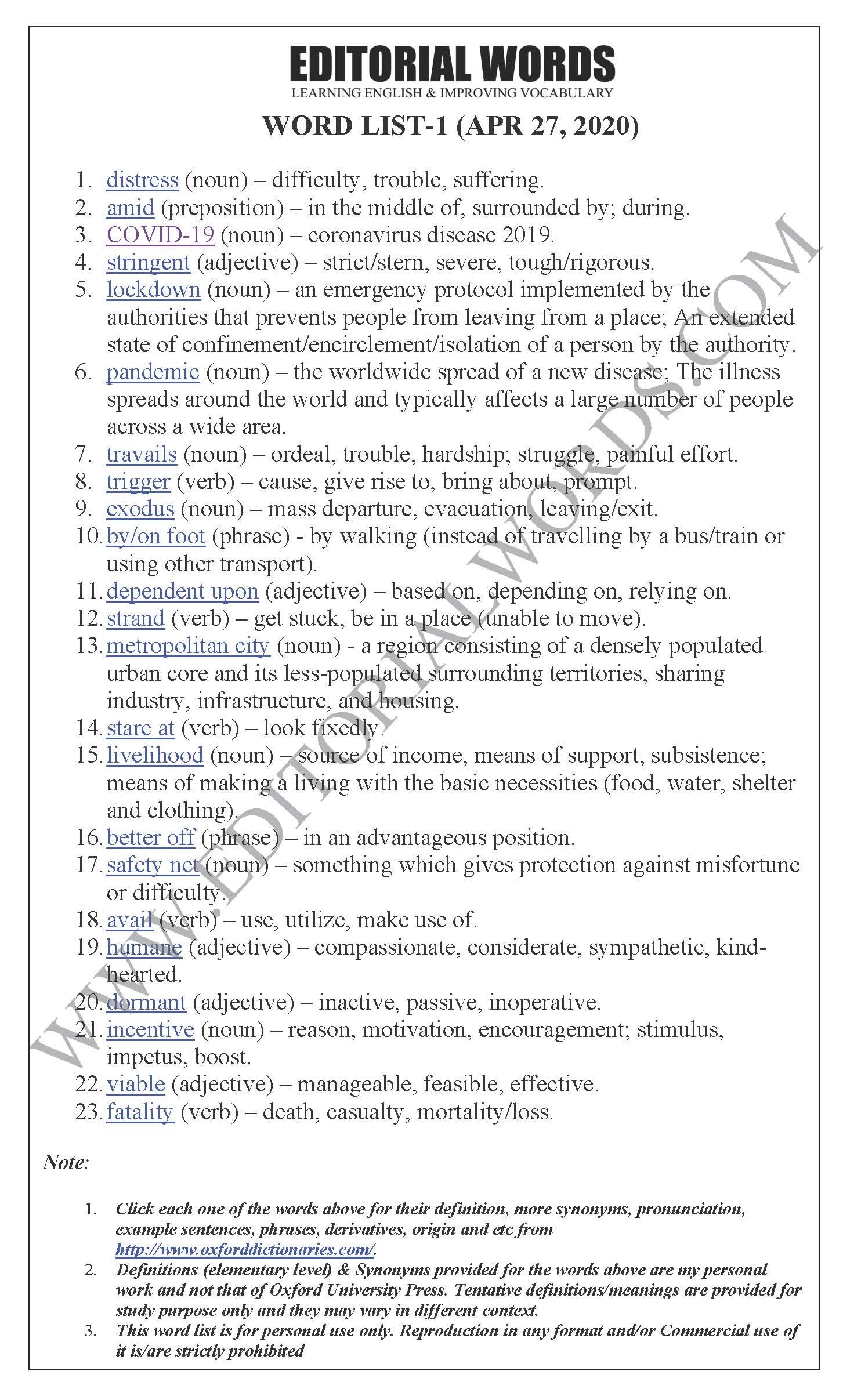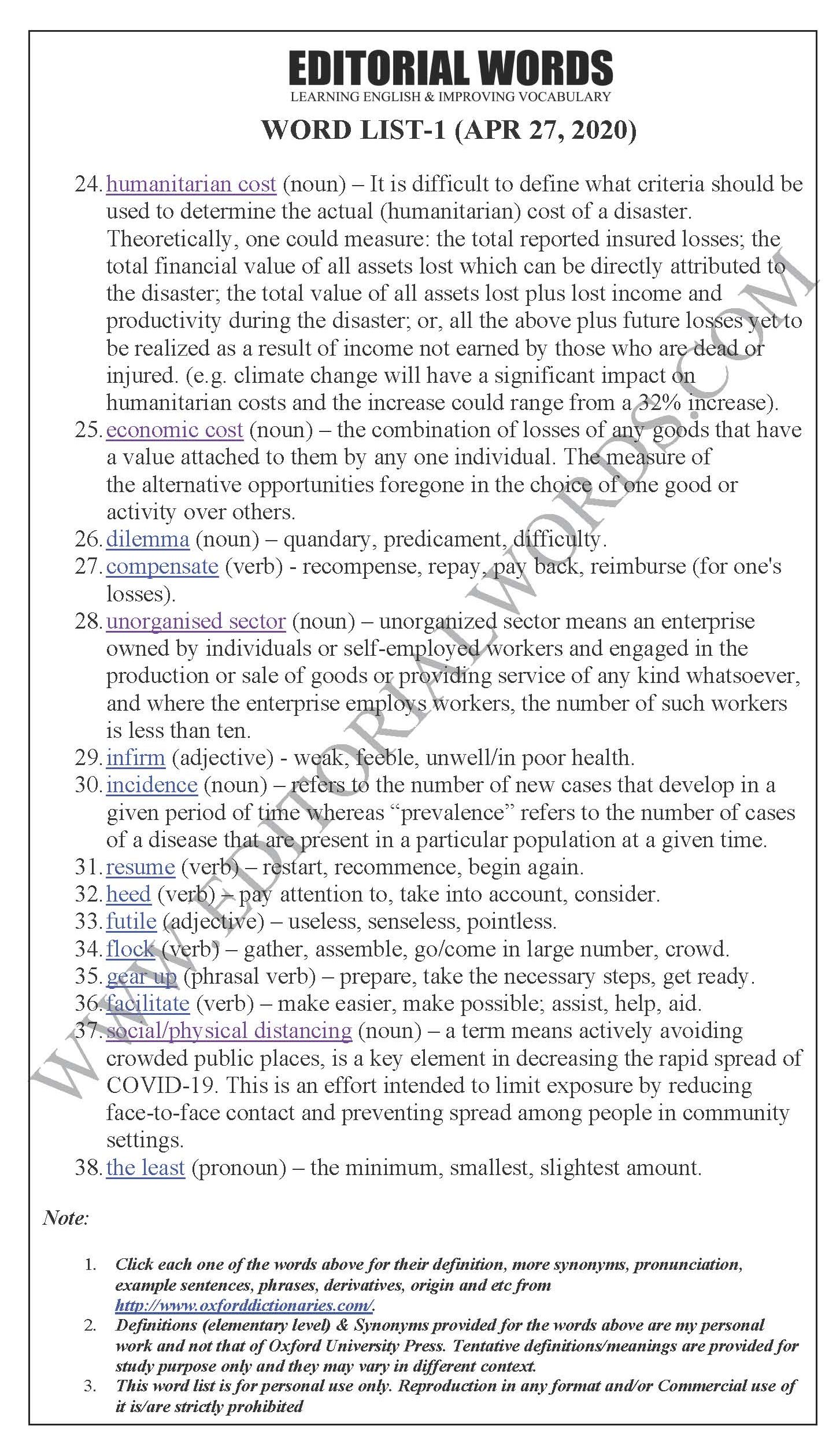The Hindu Editorial (Safe return) – Apr 27, 2020
A month after one of the most stringent global lockdowns was imposed in India to tackle the pandemic,… For further reading, visit “The Hindu”. Below is today’s word list-1 for The Hindu Editorial (Safe return) – Apr 27, 2020.
To read this article, click here.
This preview is provided here with permission.
Courtesy: The Hindu
Today’s word list-1 for The Hindu Editorial (Safe return) – Apr 27, 2020
- distress (noun) – difficulty, trouble, suffering.
- amid (preposition) – in the middle of, surrounded by; during.
- COVID-19 (noun) – coronavirus disease 2019.
- stringent (adjective) – strict/stern, severe, tough/rigorous.
- lockdown (noun) – an emergency protocol implemented by the authorities that prevents people from leaving from a place; An extended state of confinement/encirclement/isolation of a person by the authority.
- pandemic (noun) – the worldwide spread of a new disease; The illness spreads around the world and typically affects a large number of people across a wide area.
- travails (noun) – ordeal, trouble, hardship; struggle, painful effort.
- trigger (verb) – cause, give rise to, bring about, prompt.
- exodus (noun) – mass departure, evacuation, leaving/exit.
- by/on foot (phrase) – by walking (instead of travelling by a bus/train or using other transport).
- dependent upon (adjective) – based on, depending on, relying on.
- strand (verb) – get stuck, be in a place (unable to move).
- metropolitan city (noun) – a region consisting of a densely populated urban core and its less-populated surrounding territories, sharing industry, infrastructure, and housing.
- stare at (verb) – look fixedly.
- livelihood (noun) – source of income, means of support, subsistence; means of making a living with the basic necessities (food, water, shelter and clothing).
- better off (phrase) – in an advantageous position.
- safety net (noun) – something which gives protection against misfortune or difficulty.
- avail (verb) – use, utilize, make use of.
- humane (adjective) – compassionate, considerate, sympathetic, kind-hearted.
- dormant (adjective) – inactive, passive, inoperative.
- incentive (noun) – reason, motivation, encouragement; stimulus, impetus, boost.
- viable (adjective) – manageable, feasible, effective.
- fatality (verb) – death, casualty, mortality/loss.
- humanitarian cost (noun) – It is difficult to define what criteria should be used to determine the actual (humanitarian) cost of a disaster. Theoretically, one could measure: the total reported insured losses; the total financial value of all assets lost which can be directly attributed to the disaster; the total value of all assets lost plus lost income and productivity during the disaster; or, all the above plus future losses yet to be realized as a result of income not earned by those who are dead or injured. (e.g. climate change will have a significant impact on humanitarian costs and the increase could range from a 32% increase).
- economic cost (noun) – the combination of losses of any goods that have a value attached to them by any one individual. The measure of the alternative opportunities foregone in the choice of one good or activity over others.
- dilemma (noun) – quandary, predicament, difficulty.
- compensate (verb) – recompense, repay, pay back, reimburse (for one’s losses).
- unorganised sector (noun) – unorganized sector means an enterprise owned by individuals or self-employed workers and engaged in the production or sale of goods or providing service of any kind whatsoever,
and where the enterprise employs workers, the number of such workers is less than ten. - infirm (adjective) – weak, feeble, unwell/in poor health.
- incidence (noun) – refers to the number of new cases that develop in a given period of time whereas “prevalence” refers to the number of cases of a disease that are present in a particular population at a given time.
- resume (verb) – restart, recommence, begin again.
- heed (verb) – pay attention to, take into account, consider.
- futile (adjective) – useless, senseless, pointless.
- flock (verb) – gather, assemble, go/come in large number, crowd.
- gear up (phrasal verb) – prepare, take the necessary steps, get ready.
- facilitate (verb) – make easier, make possible; assist, help, aid.
- social/physical distancing (noun) – a term means actively avoiding crowded public places, is a key element in decreasing the rapid spread of COVID-19. This is an effort intended to limit exposure by reducing face-to-face contact and preventing spread among people in community settings.
- the least (pronoun) – the minimum, smallest, slightest amount.
Note:
1. Click each one of the words above for their definition, more synonyms, pronunciation, example sentences, phrases, derivatives, origin and etc from http://www.oxforddictionaries.com/.
2. Definitions (elementary level) & Synonyms provided for the words above are my personal work and not that of Oxford University Press. Tentative definitions/meanings are provided for study purpose only and they may vary in different context.
3. This word list is for personal use only. Reproduction in any format and/or Commercial use of it is/are strictly prohibited.
Today’s word list-1 The Hindu Editorial (Safe return) – Apr 27, 2020:


“Phrasal Verbs” We Learnt Last Week
“Idioms & Phrases” We Learnt Last Week
“Important Definitions” We Learnt Last Wek
Recent Word Lists For The Hindu Editorial Articles

Be the first to comment